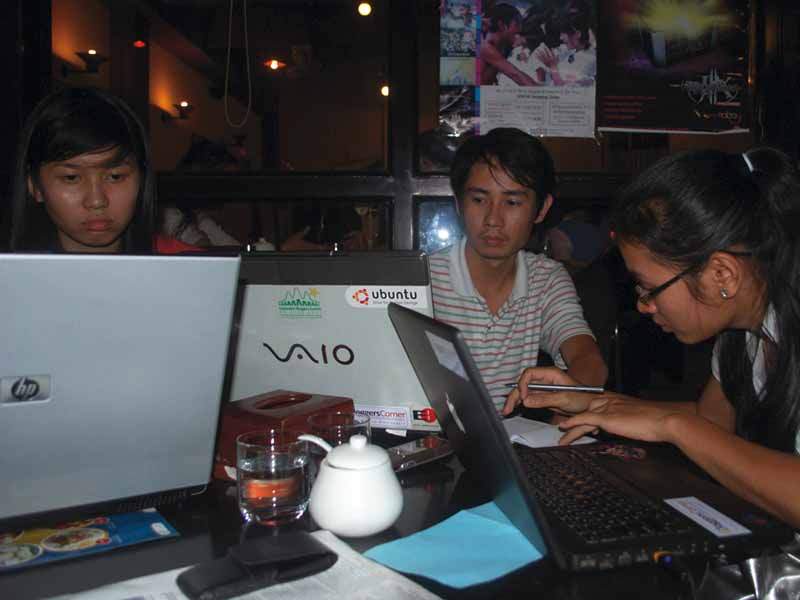Meet Cambodia's social media elite - the Cloggers
Young motivated bloggers spearheading a web-led revolution

With its jagged, pot-holed streets and swarms of begging children, visitors are often shocked at the poverty in Cambodia, widely considered Asia's backwater behind Vietnam and China.
Shacks and slums are testament to a third of the population earning less than half a US dollar a day and Transparency International ranks the country, only recently freed from years of civil war, coups and rigged elections, as the 14th most corrupt in the world.
Yet tech-savvy youngsters are bringing a new voice to Phnom Penh's poverty-wrought landscape. Hanging out in cafes and clicking away on their laptops, they comprise a small but growing middle-class of baby-boomers born during the 1980s, after the Khmer Rouge genocide left 2million Cambodians – a quarter of the population – dead. Now they've come of age, and they're wiring Cambodia with it.
They're a tight-knit clique. Led by 26-year-old writer and photographer Bun Tharum, Cambodia's first blogger, a small group formed in 2006 to give workshops on social media. With their efforts, and Cambodia's King-Father Norodom Sihanouk starting his own blog, the group of 30 soon transformed into thousands. Now, they call themselves 'Cloggers' – Cambodian bloggers.
Tharum sees change on the horizon. "After all the hardship our country has experienced, we're trying to bring a new era of innovation," he says. "Blogs are helping break down barriers, get discussions going – something we need to move forward. It's the voice of the new generation."
Reaching the summit
The group reached a peak in popularity when it held the Cloggers' Summit in August 2007, attended by 200 international guests, including editors from Harvard Law School's Global Voices Online project. Attendees discussed social networking with a Cambodian twist, looking at how non-profits – which dominate Cambodia's economy – and students could use it, despite the country's low-bandwidth connectivity.
Sign up for breaking news, reviews, opinion, top tech deals, and more.
They hit another success in September with the first annual BarCamp Phnom Penh, an event that saw hundreds from around Southeast Asia attend, including Microsoft. "BarCamp was great for thinking outside the box," Tharum says. "We got Cambodians to start speaking their minds in that untraditional setting, the un-conference."
Much more can be attributed to the city's sudden blogging craze. While less than two per cent of Cambodians have web access on their own computers, Phnom Penh sports a huge mobile web culture. "It's amazing. Farmers are selling their land so they can buy a mobile phone and motorbike," says John Weeks, an American who heads Phnom Penh's popular House 32 web design firm. "You'll see Khmers [Cambodians] wearing sandals and eating street food while talking on their Blackberrys."
Phnom Penh has just been wired with 3G technology, far ahead of neighbouring countries Vietnam and Thailand, giving blogs explosive potential. Yet phones still haven't reached their peak, Weeks insists. "Users aren't afraid of technology. But phones aren't reaching their full potential," he says. "If ordinary Cambodians can overcome the language barrier and literacy barriers, phones have incredible gateway potential that would dwarf the current blog boom."
Huddled around in Phnom Penh's sparkling new KFC – Cambodia's first foreign franchise – the Cloggers whip out cutting-edge phones yet to catch on in the West. One begins texting in a frenzy – he's on Twitter and he's addicted. The others laugh, moving into a discussion of King-Father Norodom Sihanouk, the country's leader and highest profile blogger.
He's revered by older generations, but Cloggers don't share their zest for the monarch. "Young people don't care about the King when we blog," says Sreng Nearirath, a lawyer who blogs her thoughts in My World vs. Real Scary World. "We just blog because we want to talk about our lives and talk with each other." Cambodia, a conservative society, doesn't offer opportunities to open up and discuss your feelings, especially for women. That's what makes blogs so special here.
"Men have dominated technology fields, but we're seeing more and more women speaking their minds through blogs," says Chak Sopheap, a rising voice in Cambodia's women's empowerment movement. "They give us an outlet to gain selfesteem and be more informed about the world."
Sopheap is perhaps Cambodia's most controversial blogger, touching on subjects like trafficking, corruption, forced land evictions and women's rights. Her public profile is brave; most political bloggers in Cambodia, such as the popular "Details are Sketchy" and "KI Media" blogs, are anonymous. "If everyone keeps silent to intimidation, intimidation will gain its position.
"By making our voices heard, we can create change," she insists. She's pursuing a master's degree in international relations in Japan, which she credits for bringing new angles to her blog. "I've learned from a different cultural context about how crucial good governance is," she says, referring to Cambodia's corruption problem.